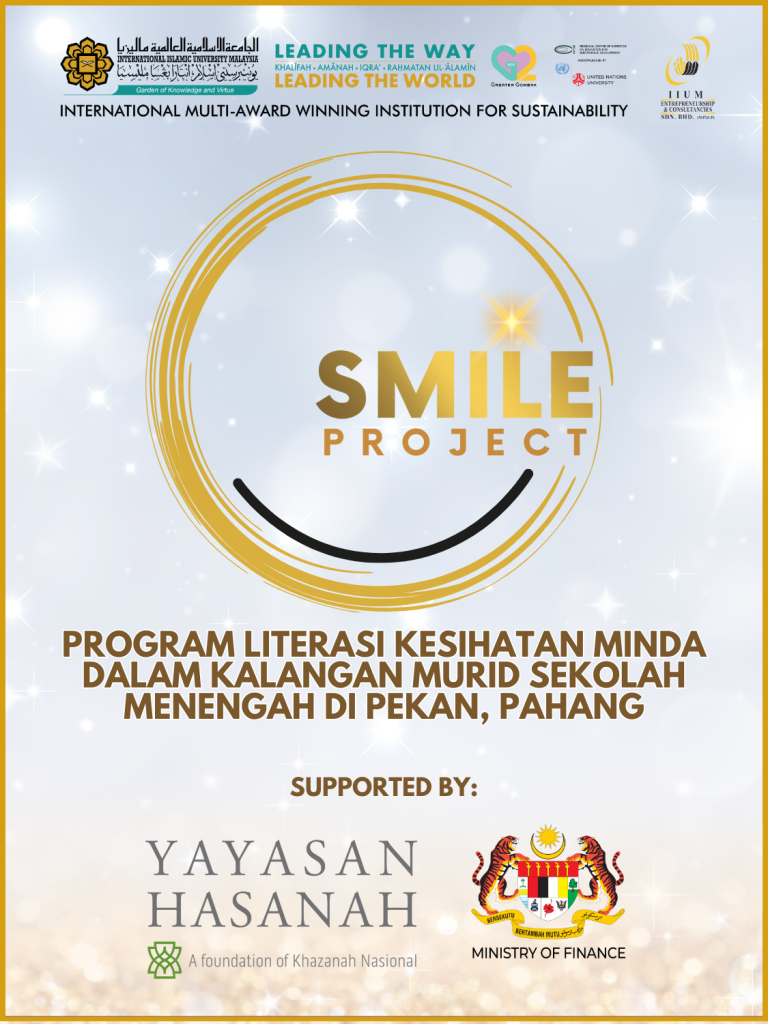Introduction
The SMILE Project was implemented in three secondary schools in Pekan, Pahang, from November 2023 to October 2025 with the aim of improving mental health literacy among students, parents, and school communities. It sought to promote awareness, encourage early detection, and establish support systems for adolescents, recognising that schools are uniquely positioned to address psychosocial needs alongside academic achievement. Over two years, the project has shown that school-based mental health promotion is not only feasible but also impactful, achieving and in several areas exceeding its intended targets.
Status: Completed
Duration: 2023-2025

Phase I
The project began with a preparation phase that focused on building the capacity of school counsellors, who are the front-liners in addressing psychosocial concerns. Eight counsellors from the three schools participated in training based on modules adapted from WHO recommendations, covering the introduction, assessment, and management of child and adolescent mental and behavioural disorders. Counsellors reported significant improvements in knowledge and skills, particularly in recognising early signs of distress and applying practical intervention strategies. Strengthening their capacity ensured that schools had a more effective internal system to respond to students’ mental health needs.
Phase II
Recognising the influence of peers in adolescent life, the next phase engaged 30 student leaders, recruited in collaboration with school counsellors and trained as SMILE Ambassadors. Through interactive workshops that included role plays, discussions, and scenario-based activities, they learned to recognise warning signs, practise active listening, provide basic support, and refer peers to counsellors when necessary. The ambassadors later implemented peer-led initiatives, normalising conversations around mental health and serving as role models for their classmates. These activities demonstrated that empowering students themselves can create lasting cultural change in schools.
Phase III
To reinforce these efforts, a SMILE Room was established in each school as a safe and comfortable space where students could relax, access resources, or seek confidential support from counsellors. The rooms symbolised the schools’ commitment to student well-being and provided a physical hub for activities. In some schools, the initiative extended beyond the rooms. At SMK Dato’ Mahmud Mat (DMASS), teachers displayed four posters and signage with mental health messages around the school compound, strengthening the visibility of the project and normalised discussions about mental health across the wider school community, showing genuine ownership and sustainability.
Phase IV
Screening and targeted intervention represented another critical step. Using the validated DASS-21 tool, 886 students completed the screening, achieving a 98.4% response rate against the target of 900. Students were categorised into five groups: normal, mild, moderate, severe, and extremely severe, allowing tailored responses. Those in the normal and mild range were encouraged to continue using the SMILE Rooms and peer networks, while students in the moderate categories received individual and group counselling sessions by clinical psychologist, focusing on stress management and resilience. Students identified as severe or extremely severe were referred to psychiatrists within the project’s network, with referrals coordinated through counsellors and parents to ensure confidentiality and follow-up. This systematic approach ensured that all students received support appropriate to their level of need.
Phase V
Parents of at-risk students were also engaged through interactive counselling sessions. Recruitment presented challenges, particularly at SMATAF where only six parents joined due to work commitments, health concerns, and scheduling conflicts. Nevertheless, the project exceeded its overall target by engaging 32 parents across all schools. Sessions were scheduled flexibly including during lunch breaks, evenings, and weekends, and offered both online and face-to-face. Each two-hour session was facilitated by mental health experts and supported with resources, including the booklet “Tenang Bersama Remaja.” Parents reported improved awareness of mental health, greater confidence in supporting their children, and stronger communication at home.

